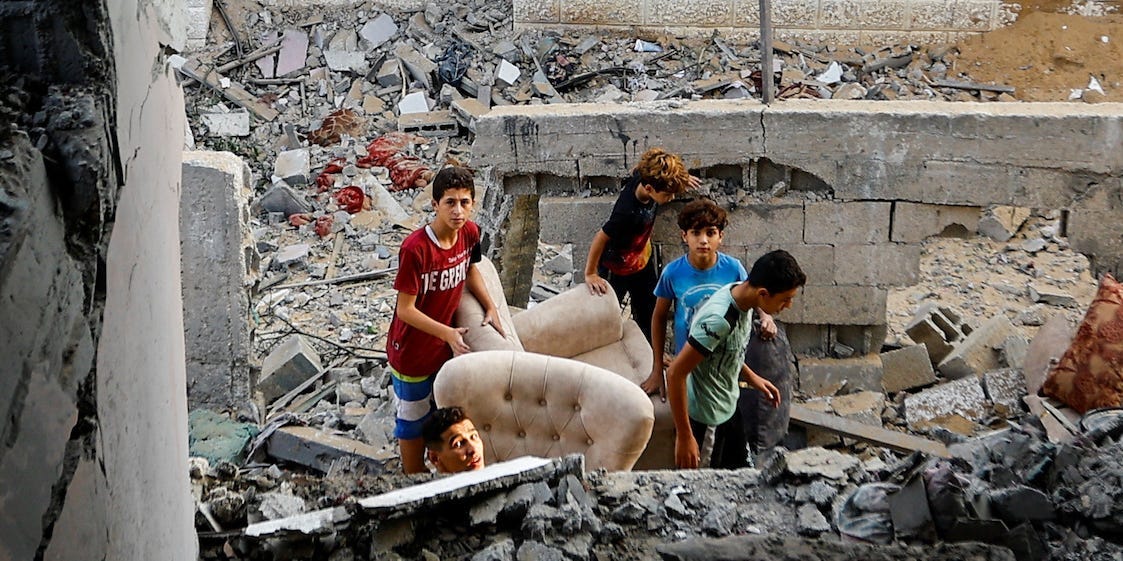Food, Fuel, And Water Scarcity In Gaza Fuel Calls To End Israeli Aid Ban

Table of Contents
The Crushing Impact of Water Scarcity in Gaza
Gaza's water crisis is a critical component of the broader humanitarian emergency. Limited access to potable water, coupled with inadequate infrastructure, threatens public health and severely restricts daily life. The high salinity of available groundwater renders much of it unsuitable for drinking and agriculture.
- Limited Potable Water: The majority of Gaza's groundwater is heavily contaminated with saltwater intrusion, making it unfit for human consumption. Existing water infrastructure is insufficient to meet the needs of the growing population, leading to frequent water shortages.
- Public Health Impacts: Water scarcity directly impacts public health, increasing the risk of waterborne diseases, compromising hygiene practices, and hindering sanitation efforts. The lack of clean water disproportionately affects vulnerable groups, including children and the elderly.
- Agricultural Water Challenges: The limited availability of freshwater severely restricts agricultural production, a vital sector for the Gaza economy and food security. Farmers struggle to irrigate crops, leading to reduced yields and economic hardship.
- International Aid and Solutions: While international aid plays a crucial role in providing emergency water supplies, long-term solutions are urgently needed. Investments in desalination plants and improved wastewater treatment facilities are critical for sustainable water management. Sustainable water resource management is crucial for future resilience.
- Desalination and Wastewater Treatment: Increasing the capacity of desalination plants and implementing effective wastewater treatment methods can significantly improve the water situation. However, these initiatives require substantial financial investment and technical expertise.
Food Insecurity and its Devastating Consequences
Food insecurity in Gaza is widespread, with high rates of malnutrition among children and adults. The blockade and import restrictions severely constrain access to essential food supplies, compounding the challenges of local agricultural production.
- High Rates of Malnutrition: The limited availability of nutritious food leads to widespread malnutrition, particularly among vulnerable populations. This has long-term consequences for health and development, especially for children.
- Limited Agricultural Production: Soil degradation, water scarcity, and import restrictions significantly limit agricultural output. Farmers face immense difficulties in cultivating crops, impacting food production and livelihoods.
- Reliance on Food Imports: Gaza heavily relies on food imports to meet its nutritional needs. However, the blockade and import restrictions create severe challenges in accessing sufficient and affordable food supplies.
- Impact on Public Health and Economic Stability: Food insecurity has devastating consequences on public health, causing widespread malnutrition and increasing vulnerability to diseases. It also negatively impacts economic stability, worsening poverty and hindering development.
- International Food Aid and its Limitations: While international food aid organizations provide assistance, their efforts are often insufficient to meet the growing needs. Furthermore, long-term sustainable solutions are needed to improve food security and self-sufficiency.
The Fuel Shortage and its Ripple Effects
The chronic fuel shortage in Gaza has devastating ripple effects across all sectors. Limited fuel supplies lead to frequent and prolonged electricity outages, impacting essential services and hindering economic activity.
- Chronic Electricity Shortages: The power generation capacity is severely hampered by the lack of fuel, resulting in daily power cuts that last for hours. This affects all aspects of life in Gaza, from healthcare to water treatment.
- Impact on Essential Services: Hospitals, water treatment plants, and sanitation systems rely heavily on electricity. Frequent power outages severely compromise their functionality, leading to critical disruptions in healthcare and public health.
- Consequences for Transportation, Businesses, and the Economy: The fuel shortage impacts transportation, hindering the movement of goods and people. Businesses struggle to operate, leading to economic losses and unemployment.
- Challenges of Fuel Imports and Israeli Restrictions: Importing fuel into Gaza is complex and heavily regulated, with Israeli restrictions impacting the availability and cost of fuel.
- Alternative Energy Sources: Exploring alternative energy sources, such as solar power, is crucial for reducing reliance on imported fuel and mitigating the impact of fuel shortages. Investment in renewable energy infrastructure is essential for long-term energy security.
The Israeli Aid Ban and its Humanitarian Implications
The Israeli aid ban significantly exacerbates the humanitarian crisis in Gaza. The restrictions on the movement of goods and services limit access to essential supplies, compounding the existing food, fuel, and water shortages.
- Impact of the Aid Ban: The Israeli aid ban directly limits the delivery of vital humanitarian aid, including food, medicine, and construction materials. This exacerbates existing challenges and hinders recovery efforts.
- Legal and Ethical Considerations: The restrictions on aid violate international humanitarian law and human rights principles. The ban infringes upon the right to life, health, and well-being of Palestinian civilians.
- Role of International Organizations: International organizations play a critical role in advocating for an end to the aid ban and providing humanitarian assistance. However, their efforts are often constrained by political realities.
- Diplomatic Pressure: International diplomatic pressure is crucial to influencing Israeli policy and securing an end to the aid ban. Governments and international organizations must exert pressure to ensure the delivery of essential humanitarian aid.
- Devastating Consequences for Civilians: The aid ban has devastating consequences for Palestinian civilians, contributing to widespread suffering and hindering efforts towards sustainable development and peace.
Conclusion
The combined impact of food, fuel, and water scarcity in Gaza, exacerbated by the Israeli aid ban, creates a dire humanitarian crisis. Addressing this crisis requires immediate and concerted action from the international community. The severe consequences of inaction demand urgent intervention to alleviate the suffering of the Palestinian people. Ending the Israeli aid ban is crucial to alleviating the food, fuel, and water scarcity in Gaza. Demand action from your government and international organizations to pressure for an immediate end to this humanitarian crisis and ensure the delivery of essential aid to the people of Gaza. Let's work together to overcome this critical situation and improve the lives of millions facing these immense challenges. The future of Gaza depends on a concerted effort to end this humanitarian crisis and ensure the basic human rights of its people are respected.

Featured Posts
-
 Cassidy Hutchinsons Memoir Key Jan 6 Witness Tells All This Fall
Apr 29, 2025
Cassidy Hutchinsons Memoir Key Jan 6 Witness Tells All This Fall
Apr 29, 2025 -
 Did Trumps China Tariffs Cause Higher Prices And Shortages An Economic Assessment
Apr 29, 2025
Did Trumps China Tariffs Cause Higher Prices And Shortages An Economic Assessment
Apr 29, 2025 -
 Minnesota Snow Plow Naming Contest Winners Revealed
Apr 29, 2025
Minnesota Snow Plow Naming Contest Winners Revealed
Apr 29, 2025 -
 Open Ais Chat Gpt The Ftc Investigation And Its Potential Impact
Apr 29, 2025
Open Ais Chat Gpt The Ftc Investigation And Its Potential Impact
Apr 29, 2025 -
 Anchor Brewing Company To Shutter After 127 Years A Legacy Concludes
Apr 29, 2025
Anchor Brewing Company To Shutter After 127 Years A Legacy Concludes
Apr 29, 2025
Latest Posts
-
 Nine Fatalities Reported After Vehicle Strikes Crowd At Vancouvers Filipino Festival
Apr 29, 2025
Nine Fatalities Reported After Vehicle Strikes Crowd At Vancouvers Filipino Festival
Apr 29, 2025 -
 Car Plows Into Crowd At Vancouver Filipino Festival Leaving Nine Dead
Apr 29, 2025
Car Plows Into Crowd At Vancouver Filipino Festival Leaving Nine Dead
Apr 29, 2025 -
 Vancouver Filipino Festival Tragedy Nine Dead After Car Incident
Apr 29, 2025
Vancouver Filipino Festival Tragedy Nine Dead After Car Incident
Apr 29, 2025 -
 Ohio Doctors Murder Conviction Sons Emotional Journey Before Parole Decision
Apr 29, 2025
Ohio Doctors Murder Conviction Sons Emotional Journey Before Parole Decision
Apr 29, 2025 -
 Parole Hearing Looms For Ohio Doctor Convicted Of Killing Wife 36 Years Ago
Apr 29, 2025
Parole Hearing Looms For Ohio Doctor Convicted Of Killing Wife 36 Years Ago
Apr 29, 2025
